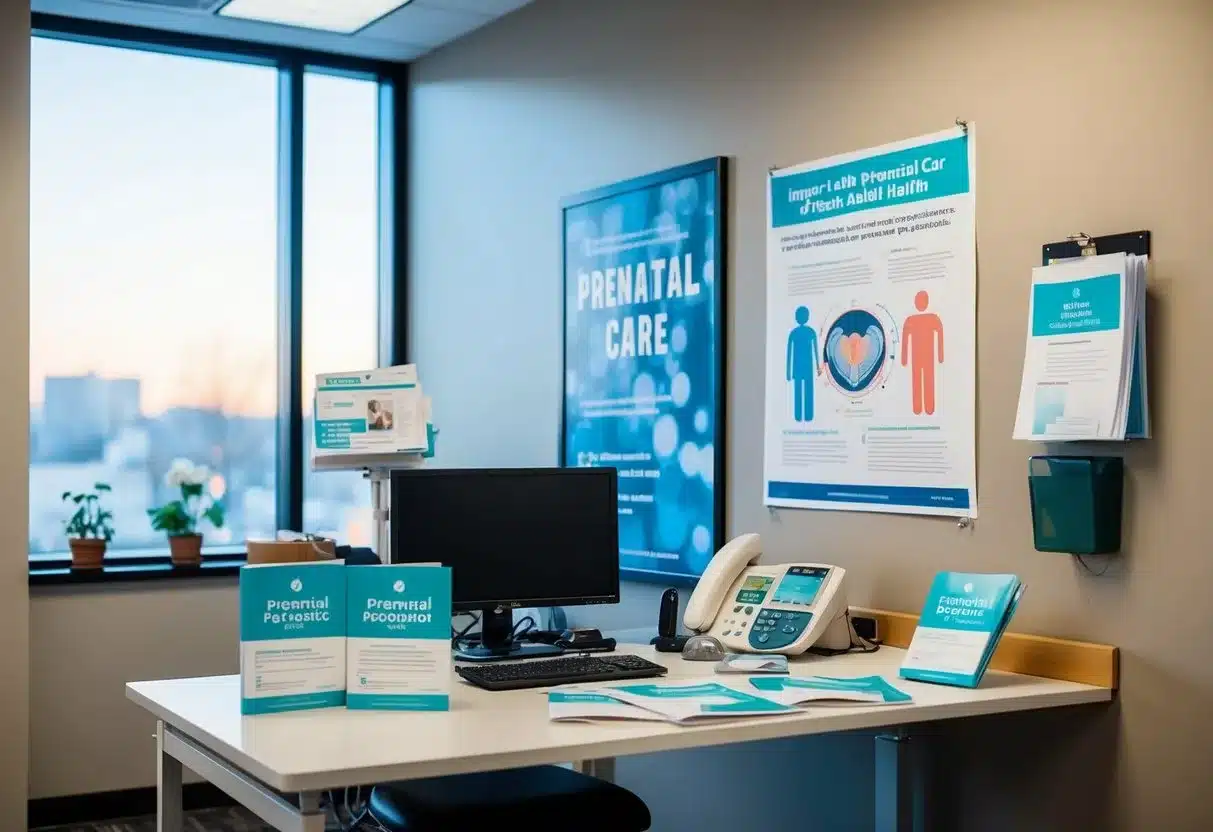Prenatal care plays a big role in shaping health throughout life. It’s not just about the nine months of pregnancy. Good care before birth can affect a person’s health as a child and adult.

Getting early and regular prenatal care improves the chances of a healthy pregnancy. This care can start even before a woman gets pregnant. A pre-pregnancy check-up can help catch and fix health issues early.
Prenatal care isn’t just about the baby. It also helps moms stay healthy. Doctors can spot and treat problems that might affect both mom and baby. This care can lead to better health for both in the years to come.
Key Takeaways
- Prenatal care affects health from birth through adulthood
- Early and regular check-ups improve pregnancy outcomes
- Good prenatal care benefits both mother and child’s long-term health
The Importance of Early Prenatal Care

Early prenatal care plays a crucial role in ensuring healthy fetal development and identifying potential risks. It allows healthcare providers to monitor and support both maternal and fetal health from the earliest stages of pregnancy.
Early Pregnancy and Fetal Development
Prenatal care should begin as soon as a woman knows she is pregnant. The first trimester is a critical time for fetal development. During this period, major organs and body systems start to form.
Regular check-ups allow doctors to:
• Monitor fetal growth
• Check for any abnormalities
• Provide vital nutrients and vitamins
Folic acid supplements, often prescribed early in pregnancy, help prevent neural tube defects. These defects can lead to serious conditions like spina bifida.
Early care also helps establish a baseline for the mother’s health. This includes checking blood pressure, weight, and running initial blood tests.
Risk Factors Identification and Management
Early prenatal visits are key in identifying potential risks to both mother and baby. Healthcare providers can screen for:
• Genetic disorders
• Chronic health conditions
• Infectious diseases
Early detection allows for prompt management of these risks. For example, if gestational diabetes is found, dietary changes and close monitoring can begin immediately.
Lifestyle factors that may harm the fetus, such as smoking or alcohol use, can be addressed early. This gives mothers more time to make necessary changes for a healthier pregnancy.
Prenatal care also includes education on proper nutrition, exercise, and other aspects of a healthy pregnancy. This knowledge empowers mothers to make informed decisions throughout their pregnancy.
Consequences of Inadequate Prenatal Care

Not getting enough prenatal care can lead to serious health issues for both mother and baby. These problems can last into childhood and even adulthood.
Adverse Pregnancy Outcomes
Inadequate prenatal care is linked to higher rates of low birthweight babies. This means babies are born weighing less than 5.5 pounds. These babies often have trouble breathing and eating.
Premature birth is another risk. Babies born too early may face health issues like:
- Breathing problems
- Heart defects
- Brain bleeds
Mothers who skip prenatal visits are more likely to have pregnancy complications. These can include high blood pressure and gestational diabetes.
Impact on Infant Mortality and Morbidity
Babies of mothers with poor prenatal care are at higher risk of death in their first year. This is called infant mortality. These babies also face more health problems, or morbidity.
Lack of prenatal care can lead to:
- Higher rates of birth defects
- More infections in newborns
- Greater chance of sudden infant death syndrome (SIDS)
Regular check-ups help catch and treat problems early. Without these visits, small issues can become big health risks for babies.
Long-Term Effects on Adult Health
The impacts of poor prenatal care can last well into adulthood. People whose mothers had little or no prenatal care may face:
- Higher rates of heart disease
- Increased risk of diabetes
- More likely to have high blood pressure
These health issues stem from problems that start before birth. Poor nutrition and stress during pregnancy can change how a baby’s body develops.
Adults born to mothers with inadequate care may also struggle with:
- Learning disabilities
- Mental health issues
- Chronic health conditions
Good prenatal care is key to a healthy start in life. It can shape a person’s health for years to come.
Determinants of Prenatal Care Access

Many factors affect a woman’s ability to get prenatal care. These include money, education, and local health services. Each plays a key role in shaping access to care during pregnancy.
Poverty and Health Disparities
Prenatal care use differs among women from various racial and social groups. Women in poverty often face barriers to care. They may lack health insurance or transportation to clinics.
Low-income areas tend to have fewer health facilities. This makes it harder for pregnant women to get regular check-ups.
Racial and ethnic minorities face added challenges. They may experience discrimination in healthcare settings. Language barriers can also limit access to quality care.
Education and Evidence-Based Educational Resources
A woman’s education level affects her prenatal care choices. More educated women tend to start care earlier in pregnancy.
Clear, simple health info helps all women make good choices. Pregnancy books, websites, and apps can teach about fetal growth and health risks.
Some key topics to cover:
- Nutrition during pregnancy
- Warning signs of complications
- Importance of regular check-ups
Doctors can give out easy-to-read materials at visits. This helps reinforce key health messages.
Community-Based Initiatives and Health Services
Local programs can improve prenatal care access. Mobile clinics bring services to rural or underserved areas.
Community health workers offer support to pregnant women. They can:
- Help with clinic appointments
- Provide health education
- Connect women to other services
Some effective approaches:
- Home visiting programs
- Group prenatal care sessions
- Partnerships with faith-based groups
These efforts help reach women who might otherwise miss out on care. They build trust and break down barriers to healthcare.
Optimal Prenatal Practices

Effective prenatal care involves a range of practices tailored to each patient’s needs. These practices aim to protect the health of both mother and baby while addressing individual concerns and experiences.
Screening and Preventive Measures
Regular prenatal visits are crucial for monitoring pregnancy progress. These visits typically include:
- Blood pressure checks
- Weight measurements
- Urine tests for protein and glucose
- Fetal heartbeat monitoring
Genetic screening and tests for infections like HIV and hepatitis B are often offered. Ultrasounds help track fetal growth and development.
Preventive measures include:
- Folic acid supplementation
- Avoiding alcohol and tobacco
- Getting recommended vaccinations
Proper nutrition and exercise are encouraged. Healthcare providers may suggest prenatal vitamins and discuss appropriate weight gain.
Individualized Care Plans and Patient Safety
Each pregnancy is unique, requiring tailored care. Individualized care plans consider:
- Medical history
- Current health status
- Previous pregnancy outcomes
- Lifestyle factors
These plans may involve extra monitoring for high-risk pregnancies. Patient safety is a top priority, with steps taken to prevent complications.
Care plans often include:
- Dietary recommendations
- Exercise guidelines
- Medication management
- Stress reduction techniques
Regular communication between patient and provider ensures the plan stays up-to-date as the pregnancy progresses.
Trauma-Informed Care and Trust in Health Care Services
Trauma-informed care in prenatal settings recognizes the impact of past experiences on current health. This approach:
- Creates a safe, supportive environment
- Respects patient autonomy
- Builds trust between patients and providers
Providers trained in trauma-informed care are better equipped to handle sensitive topics. They offer emotional support and connect patients with mental health resources when needed.
This approach can lead to:
- Improved patient engagement
- Better adherence to care plans
- Reduced anxiety about pregnancy and childbirth
By fostering trust, trauma-informed care helps ensure patients feel comfortable seeking help throughout their pregnancy journey.
Maternal Health and Its Influence on Perinatal Outcomes

A mother’s health greatly affects her baby’s growth and birth. Good care before and during pregnancy can lead to better results for both mom and baby.
Complications: Gestational Diabetes and Preeclampsia
Gestational diabetes can cause big babies and early birth. It may also lead to health problems for the baby later in life.
Preeclampsia is marked by high blood pressure and can be risky for mom and baby. It may cause slow growth or early birth.
Both issues need close watching by doctors. Good diet and exercise can help prevent these problems.
Obesity, Smoking, and Lifestyle Factors
Being very overweight raises the risk of many pregnancy problems. It can lead to diabetes, high blood pressure, and hard births.
Smoking harms the baby’s growth and can cause early birth or stillbirth. Quitting is best for mom and baby’s health.
Eating well and staying active help keep mom and baby healthy. These good habits can prevent many risks.
Maternal Care and Obstetric Clinicians
Regular check-ups with doctors or midwives are key for a healthy pregnancy. They can spot problems early and give the right care.
Good maternal care includes:
- Prenatal vitamins
- Health screenings
- Advice on diet and exercise
- Mental health support
Skilled clinicians help ensure safe births. They can handle emergencies and give the best care to mom and baby.
Infant Health Indicators and Growth Standards
Infant health indicators and growth standards help track a baby’s development from birth. These measures give doctors and parents key information about a child’s wellbeing in the early stages of life.
Birth Weight and Fetal Growth
Birth weight is a crucial indicator of infant health. A normal birth weight ranges from 5.5 to 8.8 pounds. Babies below or above this range may face health risks.
Fetal growth is tracked during pregnancy using ultrasounds. Doctors measure the baby’s size and compare it to growth charts. This helps spot potential issues early.
Low birth weight can lead to problems like:
- Breathing difficulties
- Infections
- Feeding challenges
High birth weight may increase the risk of:
- Birth injuries
- Childhood obesity
Neonatal Health Outcomes
Neonatal health outcomes cover a baby’s first 28 days of life. Key indicators include:
- Apgar scores: Measure a newborn’s condition at 1 and 5 minutes after birth
- Feeding patterns: How well and how often the baby eats
- Weight gain: Expected to regain birth weight by 2 weeks old
- Jaundice levels: Checked through blood tests
Doctors also monitor vital signs like heart rate, breathing, and temperature. These signs can reveal potential health issues early on.
Prenatal care plays a big role in neonatal health. Babies whose mothers received good prenatal care often have better outcomes.
Prematurity and Immaturity Complications
Premature babies are born before 37 weeks of pregnancy. They face higher risks of health problems due to their immature organs.
Common complications include:
- Breathing problems
- Feeding difficulties
- Temperature regulation issues
- Brain bleeds
Very premature infants (born before 32 weeks) may need special care in a Neonatal Intensive Care Unit (NICU).
Long-term effects of prematurity can include:
- Developmental delays
- Learning disabilities
- Vision or hearing problems
Early intervention and close monitoring can help improve outcomes for premature babies.
The Broader Scope of Prenatal Care

Prenatal care extends far beyond routine check-ups. It impacts many aspects of health, from early childhood to adulthood. This care also involves different medical specialties and global health initiatives.
From Perinatology to Pediatric Care
Perinatology focuses on high-risk pregnancies and fetal health. It links closely with pediatric care after birth. Prenatal care can increase well-child visits in early childhood. This shows its lasting impact.
Neonatal health is a key concern in perinatology. Doctors watch for issues that could affect the baby after birth. They may plan special care if needed.
Good prenatal care often leads to better neonatal outcomes. Babies whose mothers had regular check-ups tend to be healthier at birth. This gives them a strong start in life.
Observational Studies and Clinical Training
Observational studies help improve prenatal care. They look at real-world results without changing normal care routines. These studies can find links between prenatal care and long-term health.
Clinical training for doctors and nurses is crucial. It teaches them to spot risks early. This training covers both normal pregnancies and high-risk cases.
Hands-on experience is a big part of this training. Students learn to do exams and use medical tools. They also practice talking to patients about health concerns.
The Role of the World Health Organization
The World Health Organization (WHO) sets global standards for prenatal care. It gives advice on how often women should have check-ups. The WHO also suggests which tests are most important.
In poor countries, the WHO works to make prenatal care available to more women. It trains local health workers and helps set up clinics. This work aims to reduce deaths of mothers and babies.
The WHO also tracks prenatal care use around the world. It uses this data to find areas that need more help. This global view helps improve care for all women.
The Role of Societal Factors in Prenatal Outcomes

Social and economic conditions have a big impact on prenatal health. Education, income, and racial factors all affect how mothers and babies fare during pregnancy and birth.
Socioeconomic Deprivation and Education Level
Low education levels often lead to worse prenatal care. Women with less schooling may not know as much about health during pregnancy. They might not go to the doctor as often.
Income also plays a key role. Poor women often can’t afford good food or health care. They may live in areas with more pollution or stress. This can harm the growing baby.
Lack of money and education can create a cycle. Babies born to poor moms may have health issues. These issues can affect them as they grow up. Then they may struggle as adults too.
Racism, Health Equity, and Resilience Factors
Race affects pregnancy health in unfair ways. Women of color often get worse prenatal care. This is due to racism in health systems. It’s also because of less access to good care in their communities.
Stress from racism harms moms and babies. It can lead to early births and low birth weights. These put children at risk for health problems later.
But there is hope. Some factors help moms stay healthy despite hard times. Strong family ties and community support make a big difference. Good mental health care also helps a lot.
Emerging Trends and Research in Prenatal Care

New discoveries in prenatal care are changing how we think about fetal health. These advances focus on biomarkers, preterm birth, and heart disease links.
The Significance of Biomarkers
Biomarkers are becoming more important in prenatal care. They help doctors spot problems early. Some biomarkers show if a baby might be born too soon. Others point to possible health issues later in life.
Blood tests can now find tiny bits of the baby’s DNA. This helps check for genetic problems without risky procedures. New tools also look at proteins and hormones in the mother’s blood.
These tests give a clearer picture of how the baby is growing. Doctors use this info to make better care plans. As science improves, more helpful biomarkers will likely be found.
Advances in Understanding Spontaneous Preterm Birth
Scientists are learning more about why some babies come early. This knowledge is key to stopping preterm births. New research looks at the mother’s immune system and how it affects pregnancy.
Studies show that certain bacteria in the birth canal might lead to early labor. Doctors are testing ways to change these bacteria to help pregnancies last longer.
Stress also plays a big role in preterm birth. New programs help pregnant women deal with stress better. These efforts aim to keep babies in the womb longer, giving them a healthier start.
Cardiovascular Diseases Linked to Prenatal Factors
Heart health starts before birth. New research shows that what happens in the womb can affect heart health years later. High blood pressure during pregnancy can lead to heart problems for both mom and baby.
Doctors now watch blood flow to the baby more closely. This helps catch early signs of heart issues. They also look at how the mother’s diet and exercise affect the baby’s future heart health.
Some hospitals now offer special care for women with heart risks during pregnancy. This care continues after the baby is born to protect long-term health.
Frequently Asked Questions
Prenatal care plays a crucial role in shaping both childhood and adult health outcomes. It impacts child development, long-term health, and maternal well-being through various key components and practices.
How does adequate prenatal care contribute to child development?
Adequate prenatal care supports healthy child development by promoting a healthy pregnancy. It ensures proper fetal growth and development through regular check-ups and screenings.
Prenatal care helps identify and address potential health issues early. This early intervention can prevent or minimize developmental problems in children.
What are the long-term effects of prenatal care on adult health?
Prenatal care can have lasting effects on adult health. It helps reduce the risk of chronic diseases like diabetes and heart conditions later in life.
Good prenatal care also supports proper brain development. This can lead to better cognitive function and mental health in adulthood.
Can prenatal care influence the overall lifetime health of a child?
Yes, prenatal care can significantly influence a child’s lifetime health. It sets the foundation for a healthy start in life, which can have long-lasting effects.
Pre-pregnancy care also plays a role in a child’s overall health. It helps ensure the mother is healthy before conception, further benefiting the child’s long-term well-being.
What are the critical components of prenatal care for maternal health?
Critical components of prenatal care include regular check-ups, screenings for health conditions, and nutritional guidance. These help monitor the mother’s health throughout pregnancy.
Prenatal care also involves education on healthy behaviors during pregnancy. This includes advice on diet, exercise, and avoiding harmful substances.
How can inadequate prenatal care negatively impact child development?
Inadequate prenatal care can lead to various developmental issues in children. It may result in low birth weight, premature birth, or birth defects.
Lack of proper care can also increase the risk of developmental delays. These delays may affect a child’s physical, cognitive, or emotional growth.
What are the primary reasons for medical care during pregnancy?
The main reasons for medical care during pregnancy include monitoring fetal growth and development. Regular check-ups help ensure the baby is growing properly.
Prenatal care also focuses on managing the mother’s health. This includes controlling existing health conditions and preventing pregnancy-related complications.